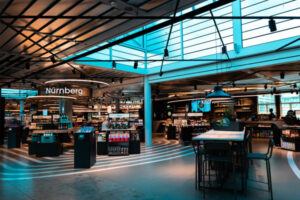What is the Retail PIN?
The Retail PIN (Positions/Insights/Network) is a competence network for the retail real estate industry. It is aimed at companies that want to promote the interplay between retail and real estate. A key focus is on the dynamic changes shaping the sector: Social and ecological sustainability, increasing efficiency through digitalization, and how retail properties can develop into multifunctional places that attract and retain visitors. “The Retail PIN sees itself as a platform for well-founded analyses and innovative strategies that shape and develop the real estate sector sustainably,” say the initiators.
With semi-annual position papers and exclusive dialog formats (online and networking events), the Retail PIN promotes discussions beyond standard solutions and aims to develop new approaches.

Partners bundle expertise:
The partners of Retail PIN are MEC, Dr. Lademann & Partner, Nuveen Real Estate, GSK Stockmann, Savills, and WISAG. These renowned companies contribute comprehensive expertise in real estate management, investment, consulting, law, and facility management. The combined knowledge in Retail PIN is intended to help shape change in the sector and provide new impetus through practical solutions.
Key points of the first position paper
The Retail PIN’s first position paper analyzes six key topics that are decisive for the future viability of the retail real estate sector. The starting point is retail parks, but the findings are also relevant for other asset classes.
Securing the future of retail locations: The focus is on the resilience of retail parks, which need to realign towards an experience orientation and target group-specific offers in response to changing customer needs and demographics.
Refurbishment and modernization: The paper highlights sustainable and economical strategies for modernizing existing retail properties, which can keep them attractive and profitable in the long term.
Sustainability as a success factor: The position paper shows how retail properties can become pioneers in environmental awareness, reducing CO2 emissions, and operating buildings energy-efficiently.
Political framework conditions: The Retail PIN outlines the political requirements and regulations that shape the industry and shows scope for action to proactively adapt to changing legal conditions.
Legal requirements: The position paper provides an overview of legal challenges arising from the further development and modernization of retail properties and describes how companies can meet them.
Market development: Finally, the paper illuminates the division of the investment market for retail properties and the positioning of retail parks in this environment.
With these topics, the Retail PIN aims to provide practical guidance to industry players and contribute to an active dialog on the future of retail real estate. The regular publication of position papers and the dialog offered by the Retail PIN is intended to accompany the sector in the long term and develop it further in a targeted manner.







